
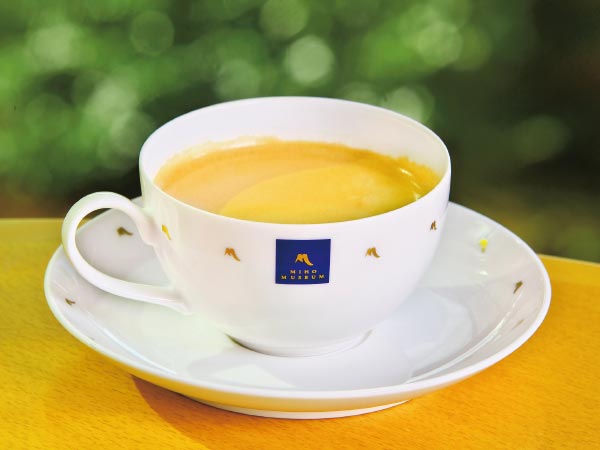

The coffee we serve at MIHO MUSEUM comes
from the Jacarandá Estate in Brazil. It has a refreshing sweetness
and deep aftertaste that spreads across your palate. As you draw
your face near, warm steam and rich fragrances rise from the
coffee-filled cup. Where does the mildness of this coffee come
from? Around the time the coffee berries ripen, the mucilage or
juicy pulp between the beans and their outer skin begins to
permeate slowly throughout as the beans are sun dried. Even with
these slow roasted beans, in which a sweet flavor has been drawn
out, you would think the secret to such a taste could exist
elsewhere.
Last December, Cassio Franco Moreira of
the Jacarandá Estate came to visit MIHO MUSEUM. He explained to
us about the estate and their coffee with his relaxed facial
expression. While managing his family coffee plantation, Cassio
also works enthusiastically for the World Wildlife Fund (WWF).
His grandfather, Carlos Franco, was the first coffee grower in
Brazil to have taken on the challenge of producing organic
coffee beans about twenty years ago. At that time, no one
questioned the use of agrichemicals. But one day, a cow
accidentally drank liquid fertilizer that was meant to be used
in the fields and died. Seeing this, Carlos realized that he
should not spray his coffee field with pesticides and other
agrichemicals. He immediately stopped using them and switched to
organic farming.
Then, six years ago, touched by the strong wishes of MIHO
MUSEUM’s restaurant staff, members of the Jacarandá Estate
created a special area to grown coffee beans using Shumei
Natural Agriculture farming. The Shumei Natural Agriculture
field uses absolutely no agrichemicals and no chemical or even
organic fertilizers. This field relies solely on nature’s
bounties and great efforts were made to prepare an amiable
environment for the plants. Recently, coffee saplings were
planted in banana fields because the two plants grow well
together in the same soil. Tall trees can also be seen
interspersed among the coffee trees. These tall trees, known as
Pereira, provide a full verdant canopy during the hot season for
the coffee plants, which do not do well in strong direct
sunlight. In the cold season, when the Pereira leaves fall, the
dried foliage offer a warm cover for the roots of the coffee
trees, and from between the barren branches pour in sunlight,
which gently warms the ground. These plants coexist on the
Jacarandá Estate. Perhaps, at a glance, it looks like a jungle.
But isn’t this nature itself?
The research-minded Cassio Franco Moreira diligently and
enthusiastically analyzes the volume of leaves at the Estate. (top)
enthusiastically analyzes the volume of leaves at the Estate. (top)
Carlos Franco, a pioneer in organic coffee production in
Brazil.
(center)
(center)
Smooth cream on the surface of our delicious
coffee. (bottom)
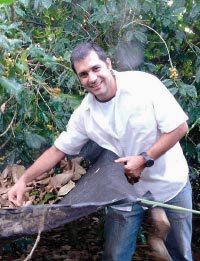 |
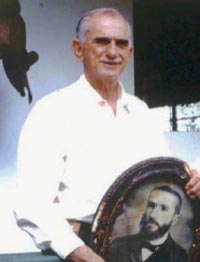 |
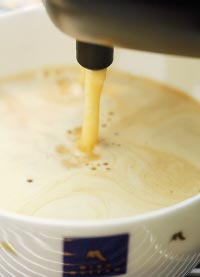 |
Incidentally, at the moment, the
harvest at the Jacarandá Shumei Natural Agriculture field
appears to be falling. Cassio explains that this is because the
roots, which had been absorbing the nourishment from organic
fertilizers that were previously used, has been steadily growing
under the ground and is in the process of absorbing sufficient
nourishment from the soil to become stronger. His confident,
calm words take a positively natural stance. We look forward to
some coffee, which has fully absorbed the energy of the earth by
the time the soil has returned to its true natural state.
One other thing, all the labor at the
Jacarandá Estate is done manually. Although the reason in part
has to do with their jungle-like fields with bananas down a
hillside, the people here have greatly valued the toils of the
land generation after generation. They take pride that the
people of this land will live here for a very long time and that
their work will be continued by the next generation. The mild
and gentle flavor of Jacarandá’s coffee is filled with the
warmth of Grandpa Carlos who has cared for his employees on the
estate like family.
After hearing Cassio speak, our hearts were filled
with happiness. We hope you will enjoy the flavor of nature’s
gift, the coffee of the Jacarandá Estate, which connects a style
of coffee making that values people and nature with the next
generation.
|
Coffee saplings growing between banana trees.
At a glance, it looks like a jungle. (right) Shumei Natural Agriculture’s ripened
coffee berries. (below) 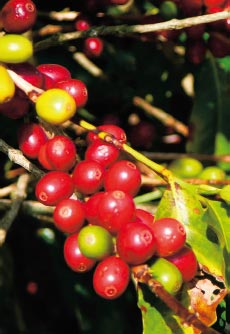 |
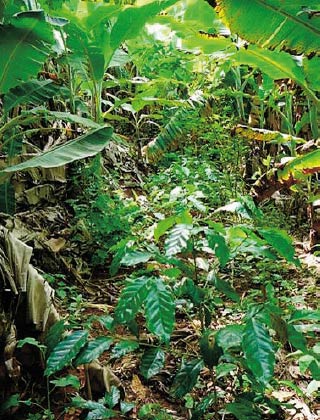 |